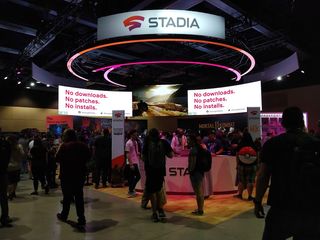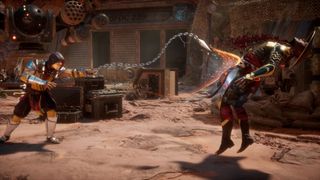Why Google Thinks Stadia Will Succeed, Despite Past Fizzled Projects
Google has invested a lot in Stadia

SEATTLE – I’ve seen Google Stadia at three events now, and gone hands-on with its predecessor, Google Stream, in the Tom’s Guide office. Each time I’ve played through a brand-new, big-budget game on Google’s streaming servers, I’ve been very impressed with the whole experience. Games perform flawlessly on almost any kind of hardware, and your progress gets saved, even when Internet connections aren’t perfect. Stadia titles look gorgeous, and are just as easy to access from a PC as from a cell phone.
Nevertheless, I’m still not sure just what would make the Stadia service so indispensable, at least for fans who already own a console or PC.
Google addressed some of my concerns at PAX West 2019, where I also got to go hands-on with Mortal Kombat 11 on both an Android phone and a PC. As always, Google gave sensible answers and the game played impeccably, although I still have a few lingering questions about Stadia’s performance and potential longevity.
Mortal Kombat 11 on Stadia
First and foremost, Mortal Kombat 11 on Stadia looks like a flawless victory. I played two matches: one on the Android phone (a new-ish Samsung; I did not get the exact model number) and one on a Chromebook laptop, hardwired into a TV. Despite the phone’s teeny-tiny text and minuscule character models, the action proceeded beautifully, at full 1080p and 30 frames per second.
I chose Liu Kang and proceeded to pummel Scorpion. Every kick, punch and blood splatter occurred without lag, and the effects-intensive Fatal Blows rendered in all their particle-effects glory. However, tagging moves onscreen – a very useful maneuver on a full-size display – was relatively useless here, since the font was too small to read. Playing on the phone is probably not the ideal way to experience the game, but just having the option is one of Stadia’s big draws.
On the other hand, when it was time to try the game on the TV, I was disappointed to discover that Google was not yet ready to show one of Stadia’s most potentially useful features. I asked how I could transfer my game from the phone to the TV seamlessly, like Google’s shown off in the Stadia trailers. The rep replied that the functionality will be available at launch, but it wasn’t ready just yet. To play Mortal Kombat 11 on the TV, I had to stop what I was doing on the phone and start up a whole new session.
Even so, once I got on the TV, the experience was just as seamless as before – save for a little graphical fuzziness when the game first loaded up. This time, I pitted Johnny Cage against Sub-Zero, and enjoyed the game’s deep combat, fluid animations and gory kills. This time, I could even read the text on the tagged moves – although it didn’t help when I botched the button combination for a Fatality.
On both the phone and the TV, I used Google’s Stadia controller, which was both comfortable and responsive. The rep pointed out that I’ll be able to use any kind of controller I want in November, including an Xbox controller or a PlayStation DualShock 4. He also said that our connection was hardwired and capped at 25 Mbps, which is the recommended speed for 1080p streams. Users who want full 4K, 60 fps performance will need much better speeds – which aren’t always easy to get, if you plan to play with wireless Internet.

Will Google kill Stadia?
Even though I had a great time with Mortal Kombat 11, I still had a few nagging questions about Stadia. First, I wanted to know what advantages it offered over a traditional console or PC. After all, thanks to increasing Internet speeds and universal game availability, downloading games is not nearly the hassle it was even just a few years ago – and a downloaded game won’t stop functioning if your Internet blinks.
The Google rep replied with three major Stadia perks. First, he explained that game downloads have gotten bigger over the years, and so have their patches. When you consider how long it takes to download both games and their massive updates, Stadia could save a lot of time. Plus, you’ll never have the unpleasant experience of sitting down to play a game, only to find a massive patch waiting for you instead.
Second, gamers can take their Stadia libraries with them anywhere, particularly if they travel frequently. While few people schlep PS4s on business trips, almost everyone brings a laptop – which means it would be trivial to pack a controller as well and enjoy almost any title on the go.
Finally, Stadia could benefit nontraditional gamers, who want titles here and there, but don’t want to invest in a whole console or PC to play them. The rep brought up a Cyberpunk 2020 tabletop gamer who really wants to play Cyberpunk 2077, but doesn’t want to spend $360 (console plus game) on the experience.
I also pointed out that Google has something of a track record of launching promising projects, then killing them off a year or so later after they fail to resonate with an audience. (Or sometimes they resonate with an audience, but get killed off anyway, like Google Reader.) One repository has tracked (at the time of writing) 175 failed Google projects.
The rep replied that any new product represents a risk, but that Google had invested a lot of time and resources in Stadia, and put an unusual amount of company weight behind it. Sundar Pichai, the CEO of the company, introduced the product himself at GDC 2019. Pichai doesn’t often give presentations himself, even when it comes to major hardware like the Pixel 3. Google had also spent a considerable amount of money building the infrastructure necessary to host a game-streaming service, including moving whole teams and their families across the country.
Finally, Google has hired big names to man their Stadia team, such as Phil Harrison and Jade Raymond. If they and their teams can collaborate to bring a lot of original content to Stadia, Google hopes that fans will invest in Stadia for content they can’t find anywhere else.
As before, I see a lot potential in Stadia, as well as a lot of potential pitfalls. At the very least, Google very much wants to see it succeed – and it runs Mortal Kombat 11 like a dream.
Be sure to follow our Pax West 2019 hub for the latest news and impressions out of Seattle.
Sign up to get the BEST of Tom’s Guide direct to your inbox.
Upgrade your life with a daily dose of the biggest tech news, lifestyle hacks and our curated analysis. Be the first to know about cutting-edge gadgets and the hottest deals.
Marshall Honorof is a senior editor for Tom's Guide, overseeing the site's coverage of gaming hardware and software. He comes from a science writing background, having studied paleomammalogy, biological anthropology, and the history of science and technology. After hours, you can find him practicing taekwondo or doing deep dives on classic sci-fi.

